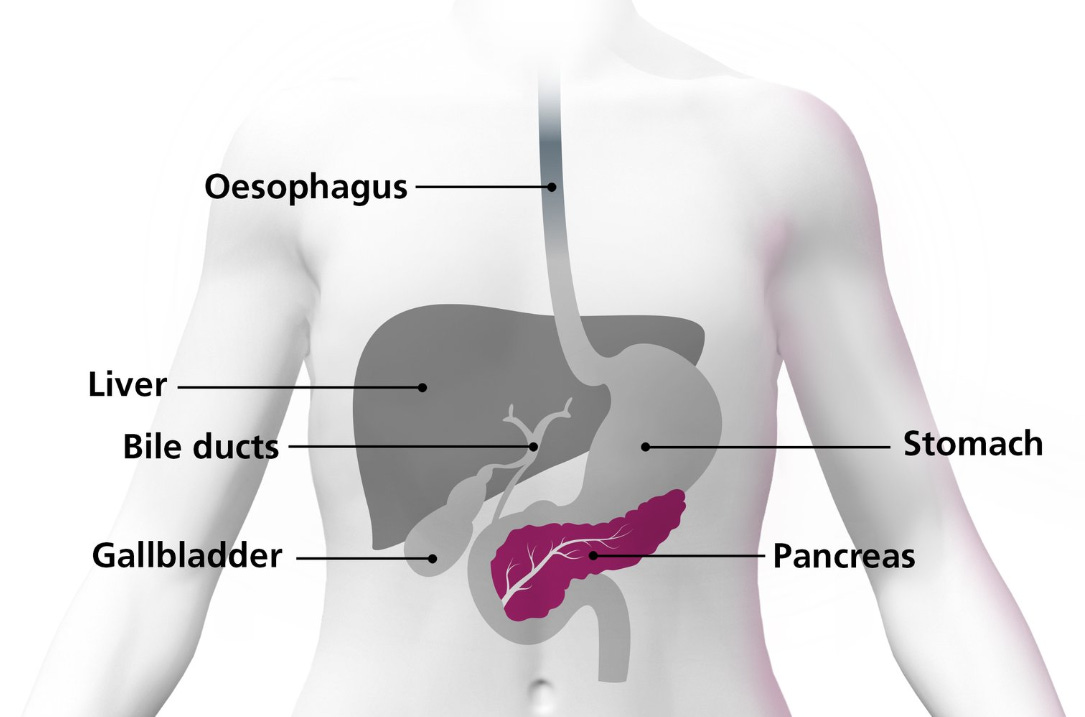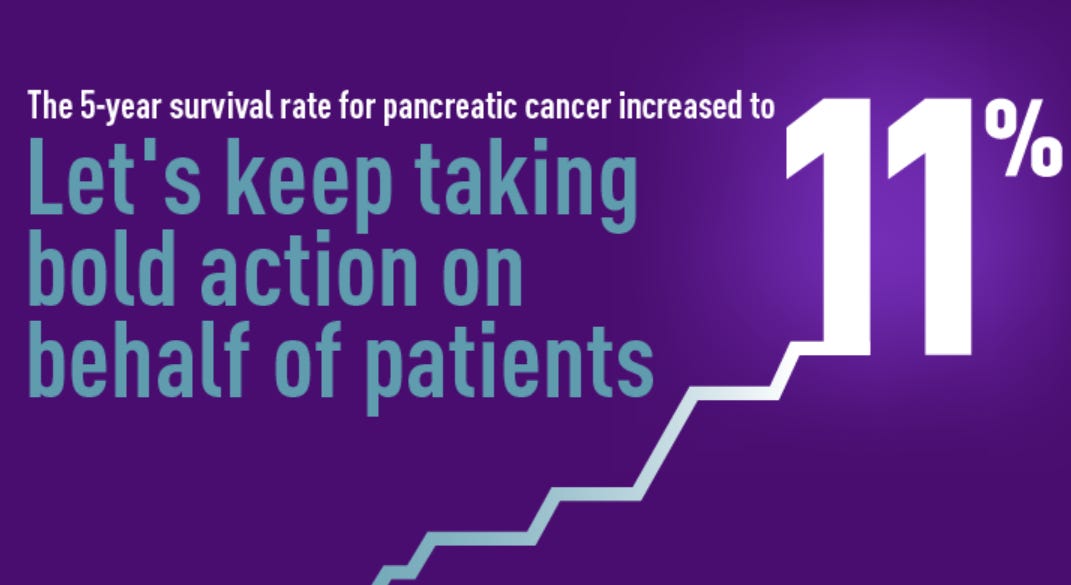🩺 A.I. Can Predict Pancreatic Cancer Up to 3 Years Before Diagnosis
More than 64,000 Americans are expected to be diagnosed with pancreatic cancer in 2023. Five year survival rate is just 12%.
Welcome Back!
This Sunday post is just a short review of a specific topic from earlier in May in healthcare covering the PR. Read this on the web or click on the title to read without Gmail limits. For the best reading experience read on the Substack reader app.
Follow us on the App for Notifications
It’s always worth talking about how A.I. is improving diagnosis in healthcare. If you ever catch my articles on the Benefactor section of A.I. Supremacy (archives), you know how much I try to follow the latest research in healthcare at the intersection of A.I.
A.I. diagnosis also imply an upgrade in a more personalized medicine and precision medicine.
Pancreatic cancer is a cancer that's found anywhere in the pancreas.
The pancreas is an organ in the top part of your tummy.
It helps you digest your food and makes hormones, such as insulin.
🧬 Prevalence
More than 64,000 Americans are expected to be diagnosed with pancreatic cancer in 2023. That’s 175 people who will hear the news every day.
The National Cancer Institute defines “rare cancers” as those occurring in fewer than 15 out of 100,000 people. So, affecting 13 out of 100,000 people, pancreatic cancer is considered rare.
💀Deadly
Despite these numbers that are low relative to more common cancers, pancreatic cancer is the third leading cause of cancer-related death. Pancreatic cancer has the highest mortality rate of all major cancers. For all stages combined, the 5-year relative survival rate is 12%. For the small percentage (15%) of people diagnosed with local disease, the 5-year survival rate is only 44%.
Furthermore, early-stage pancreatic tumors don’t show up on imaging tests. For this reason, many people don’t receive a diagnosis until the cancer has spread (metastasis).
So if an A.I. can help us with screening, it’s actually going to save lives ultimately.
The AI model can identify individuals with the highest risk of pancreatic cancer up to three years prior to their formal diagnosis.
A new study, led by researchers from Harvard Medical School, the University of Copenhagen, VA Boston Healthcare System, Dana-Farber Cancer Institute, and the Harvard T.H. Chan School of Public Health, has demonstrated that an AI tool can accurately identify individuals who are most susceptible to pancreatic cancer up to three years prior to their actual diagnosis, based solely on their medical records.
According to the findings, published in Nature Medicine, the use of AI in population screening could be instrumental in identifying individuals with elevated risk for pancreatic cancer and facilitating earlier diagnoses.
The researchers noted that pancreatic cancer is one of the deadliest forms of cancer and is expected to continue causing significant harm, with diagnoses often coming at advanced stages when treatments are less effective and outcomes are grim. The study suggests that AI-based screening could help to change this trajectory by detecting the disease earlier.
The paper was published on May 8th, 2023. The new research study which used the AI tool is led by investigators at Harvard Medical School and the University of Copenhagen. The findings were published in the journal Nature Medicine.
Pancreatic cancer is a leading cause of cancer-related deaths worldwide, with increasing incidence.
Approximately 80% of patients with pancreatic cancer are diagnosed with locally advanced or distant metastatic disease, when long-term survival is extremely uncommon (2–9%) of patients at 5 years.
“One of the most important decisions clinicians face day-to-day is who is at high risk for a disease and who would benefit from further testing, which can also mean more invasive and more expensive procedures that carry their own risks,” said study co-author Chris Sander in a press statement. Sander is a faculty member in the Department of Systems Biology in the Blavatnik Institute at Harvard Medical School.
Early diagnosis in the future of medicine is going to be so key, also to reduce costs of the healthcare system with an aging population in many countries. A.I. may actually thus reduce costs of healthcare at scale over time, and over the next few decades.
So what’s happening in reality? There are currently no full-proof scans for pancreatic cancer, with doctors using a combination of CT scans, MRIs and other invasive procedures to diagnose it. This keeps many doctors away from recommending these screenings.
👩🏽⚕️ A.I. will Augment and Empower Clinicians in a Number of ways in the Future of Healthcare
So how does A.I. empower clinicians in cases like this?
According to Sander, an AI tool like the one used by researchers would let medical professionals “zero in” on those with the highest risk for pancreatic cancer.
Based on this, they will understand who would benefit the most from tests, helping them improve their clinical decision-making.
“AI-based screening is an opportunity to alter the trajectory of pancreatic cancer, an aggressive disease that is notoriously hard to diagnose early and treat promptly when the chances for success are highest.”
Pancreatic cancer is one of the deadliest cancers in the world, and its toll projected to increase.
Early diagnosis with A.I. will also lead to more personalized patient journeys in healthcare.
WHY NOT GET A GROUP SUB?
Do you have a partner, friend, colleague or team of coworkers that might want to each have subscriptions at a steep discount? This publications offers you that ability. Many teams get their learning & development (education) funds to pay for it.
Using AI to identify those at risk of pancreatic cancer
In the study, the researchers trained the AI algorithm on two separate data sets, including 9 million patient records from Denmark and the United States. They “asked” the model to look for indicative signs of pancreatic cancer in the records.
Based on the data, the model was able to predict which patients are likely to develop pancreatic cancer in the future. Interestingly, many of the symptoms were not directly related to or did not originate from the pancreas.
Since A.I. can spot patterns that we cannot, it’s becoming a lot more useful in helping with scans and factors that might contribute to risk.
The study tested different versions of the AI models. These versions were designed with the ability to detect people with increased risk of pancreatic cancer in different time scales.
Namely, those with a high risk for developing cancer in six months, one year, two years and three years.
According to the researchers, each version of the model was at least as accurate at predicting the disease as genetic sequencing tools that currently are typically only available for a small subset of patients in data sets.
Tragic Mortality Rates
About 44 percent of people diagnosed in the early stages of pancreatic cancer survive five years after diagnosis, but only 12 percent of cases are diagnosed that early. The survival rate drops to 2 to 9 percent in those whose tumors have grown beyond their site of origin, researchers estimate.
Screening for the “Angry Organ” is Hard
Screening for certain common cancers such as those of the breast, cervix, and prostate gland relies on relatively simple and highly effective techniques — a mammogram, a Pap smear, and a blood test, respectively. These screening methods have transformed outcomes for these diseases by ensuring early detection and intervention during the most treatable stages.
By comparison, pancreatic cancer is harder and more expensive to screen and test for. Physicians look mainly at family history and the presence of genetic mutations, which, while important indicators of future risk, often miss many patients.
In these cases, A.I. screen begins to make a lot more sense at scale. So this is tremendously important since an AI tool that identifies those at the highest risk for pancreatic cancer would ensure that clinicians test the right population, while sparing others unnecessary testing and additional procedures.
Even with advances in surgical techniques, chemotherapy, and immunotherapy, they don’t typically do much for Pancreatic Cancer that has not been caught early.
While obviously AI models should be trained on local health data to ensure their training reflects the idiosyncrasies of local populations, A.I. screening has a bright future. How will A.I. models be trained on high quality and rich data at scale across spectrums where a family pattern of disease exists and when will this arrive for the general population? It’s hard to say but research like this lights the way.
Pancreatic cancer is resistant to many common cancer drugs, making it notoriously difficult to treat. Pancreatic cancer is responsible for approximately 3% of all cancers in the United States.
Read more Healthcare and A.I. articles in my archives with a paid subscription.
Machine Learning's Role in Healthcare is Increasing at a Frantic Pace ~ HERE.
A.I. is Starting to Build the Future of Healthcare ~ HERE.
A.I. Can Help Detect Brain Tumor Boundaries ~ HERE.
Google AI and Breast Cancer Making Progress ~ HERE.
Artificial Intelligence will enable Early Autism Detection ~ HERE.
AI and the Future of Sepsis ~ HERE.
A.I. in Alzheimer’s disease in 2022 ~ HERE.
Are A.I. Eye Checks the New Heart Disease Warning Test? ~ HERE.
Why A.I. in Healthcare is a New Paradigm ~ HERE.
AI Detects Tuberculosis from X-rays ~ HERE.
AI and Drug Overdose Deaths ~ HERE.
AI Has the Potential to Transform Healthcare ~ HERE.
AI can reveal new cell biology ~ HERE.
AI Evolving our Understanding of the Human Gut ~ HERE.
Artificial Intelligence is improving the use of Hearing Aids ! ~ HERE.
Hospitals are turning to AI to Shorten Hospital Stays ~ HERE.
A.I. Can Now Predict Tumor Regrowth in Cancer Patients ~ HERE.
Artificial Intelligence in Autism Detection ~ HERE.
The Future of A.I. in Healthcare. ~ HERE.
Artificial Intelligence is Taking on Parkinson's Disease. ~HERE.
Artificial Intelligence Helps Cut Miss Rate of Colorectal Polyps. ~ HERE.
A.I. Advances in Treatment Of Spinal Cord Injuries and Surgery. ~ HERE.
Future of A.I. in Neurosurgery. ~ HERE.
Artificial Intelligence Could Help Detect Onset of Cardiovascular Disease. ~ HERE.
Can A.I Improve our Breast Cancer Screening?~ HERE.
Artificial Intelligence is Changing the Future of Radiology. ~ HERE.
Thanks for reading! A.I. Supremacy is a top #35 publication in Technology category on Substack. This is my full-time job, I could not do it without your generous support and like-minded interest.













This is amazing, but bigger issue is that many of us already know we are at high risk for pancreatic cancer & most of us are not getting increased screening. Despite having a BRCA mutation, being a cancer survivor and having lost both my father & grandmother to pancreatic cancer I needed to tell my PCP what the high risk screening was. AI health advancements will only help if it they are accompanied by effective public education & medical training.